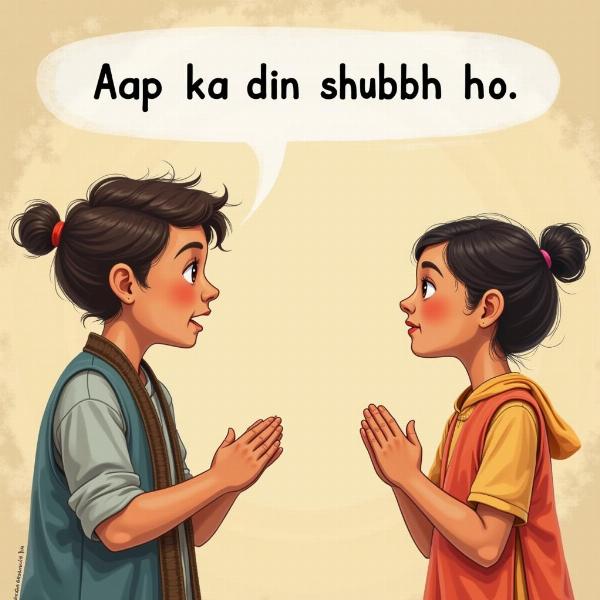Understanding how to wish someone a good day in Hindi adds a touch of cultural sensitivity and warmth to your interactions. “Have a good day” doesn’t have a single, perfect equivalent in Hindi, but several phrases capture the sentiment beautifully, depending on the context and your relationship with the person. Knowing these nuances can greatly enhance your communication and show respect for Indian culture. Let’s explore the various ways to convey “have a good day” in Hindi, along with their cultural significance.
Different Ways to Say “Have a Good Day” in Hindi
While there’s no direct translation, these phrases convey similar well wishes:
- Aap ka din shubh ho (आप का दिन शुभ हो): This is a formal and respectful way to wish someone a good day. It translates to “May your day be auspicious.” Use this with elders, superiors, or people you don’t know well.
- Aap ka din mangalmay ho (आप का दिन मंगलमय हो): Similar to the previous phrase, this also conveys a blessing for a good day, emphasizing prosperity and happiness. It’s slightly more traditional.
- Din achcha beete (दिन अच्छा बीते): This is a more casual way of saying “Have a good day.” It literally translates to “May your day pass well.” Use this with friends, colleagues, or family members.
- Achcha din ho (अच्छा दिन हो): A shorter and even more informal version of the above, suitable for close friends and family.
Choosing the Right Phrase
The best way to say “have a good day” in Hindi depends on the situation and your relationship with the person. Using the formal phrases with elders shows respect, while the informal phrases create a sense of closeness with peers.
 A person respectfully greeting an elder
A person respectfully greeting an elder
Why There Isn’t a Direct Translation
Hindi, like many other languages, focuses more on the overall sentiment rather than a literal translation. The concept of wishing someone a “good day” is embedded within broader expressions of well-being and blessings. This reflects the cultural emphasis on good fortune and positive energy.
Beyond “Have a Good Day”
There are other ways to express good wishes in Hindi depending on the time of day or occasion. For example, “Shubh ratri (शुभ रात्रि)” means “good night.”
Common Questions About Saying “Have a Good Day” in Hindi
What is the most common way to say “Have a good day” in Hindi?
“Din achcha beete (दिन अच्छा बीते)” is a widely used and versatile phrase.
Is it considered rude not to say “Have a good day” in India?
While not mandatory, offering a pleasant farewell is always appreciated. A simple “Namaste (नमस्ते)” is often sufficient.
Can I use these phrases in any part of India?
Yes, Hindi is widely understood across India, and these phrases are generally accepted.
Are there regional variations in how people say “Have a Good Day”?
Yes, different regions might have their own unique expressions. Learning these adds a personal touch to your interactions.
Embracing Cultural Nuances
Learning how to say “have a good day” in Hindi is a small but meaningful gesture. It demonstrates your willingness to engage with Indian culture on a deeper level.
Conclusion
While a direct translation of “have a good day” in Hindi doesn’t exist, several beautiful phrases capture the sentiment effectively. Choosing the appropriate expression based on the context and relationship is key to respectful and meaningful communication. By incorporating these phrases into your vocabulary, you can enhance your interactions and show appreciation for Indian culture. Understanding the cultural nuances behind these expressions adds depth to your understanding of the “have a good day” sentiment in Hindi.
FAQ
- What is the literal translation of “Aap ka din shubh ho”? May your day be auspicious.
- Is “Achcha din ho” suitable for formal situations? No, it’s best used informally.
- How do I say “Good Night” in Hindi? Shubh ratri (शुभ रात्रि).
- Is it necessary to use these phrases every time? A simple “Namaste” can often suffice.
- Can I use these phrases with Hindi speakers outside of India? Absolutely!
Meaning-Hindi.in is your trusted partner for professional Hindi translation services. We specialize in various domains, including business and commercial documents, legal and certified translations, technical manuals, website localization, educational and academic materials, and offer express translation services for urgent requests. Whether you need to translate your website for a wider audience or require accurate legal document translation, our expert team at Meaning-Hindi.in is here to assist you. Contact us today at [email protected] or call us at +91 11-4502-7584 to discuss your translation needs.